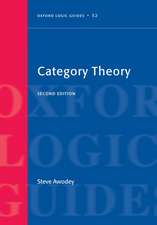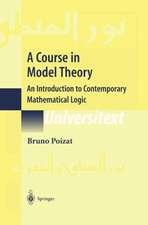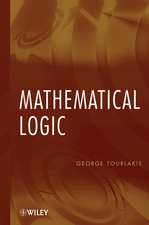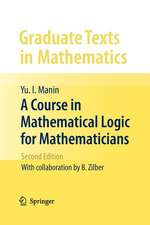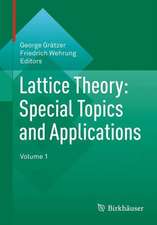Elementary Logic: For Software Development
Autor Robert Loveren Limba Engleză Paperback – sep 2008
Features: Covers elementary logic and its application to most stages of software development, discusses the application of logic to the English language, as software development begins usually with problems described by end users in ordinary English, emphasizes truth functional logic as well as quantificational logic, includes various examples and exercises to enable independent self-study.
This book provides a reader friendly foundation and offers valuable insight into the topic, serving as a helpful reference for practitioners and advanced students involved with software development.
Preț: 363.00 lei
Preț vechi: 453.75 lei
-20% Nou
Puncte Express: 545
Preț estimativ în valută:
69.47€ • 72.26$ • 57.35£
69.47€ • 72.26$ • 57.35£
Carte tipărită la comandă
Livrare economică 15-29 aprilie
Preluare comenzi: 021 569.72.76
Specificații
ISBN-13: 9781848000810
ISBN-10: 1848000812
Pagini: 328
Ilustrații: XIV, 314 p.
Dimensiuni: 155 x 235 x 17 mm
Greutate: 0.48 kg
Ediția:2008
Editura: SPRINGER LONDON
Colecția Springer
Locul publicării:London, United Kingdom
ISBN-10: 1848000812
Pagini: 328
Ilustrații: XIV, 314 p.
Dimensiuni: 155 x 235 x 17 mm
Greutate: 0.48 kg
Ediția:2008
Editura: SPRINGER LONDON
Colecția Springer
Locul publicării:London, United Kingdom
Public țintă
Professional/practitionerCuprins
Language and Logical Form.- Atomic Statements.- Compound Statements.- Quantified Statements.- Expressing Arguments.- Defining Data Structures.- Expressing Problem Specifications.- Expressing Program Designs.- Material Truth.- Truth for Statements with at Most One Connective.- Truth for Statements with Multiple Connectives.- Tracing Program Execution.- Logical Truth.- Truth Functional Forms.- Truth Functional Properties of Program Designs.- Quantified Forms.- Logical Equivalence.- Logical Implication and Validity.- Rules of Inference.- Proof.- Algorithmic Unsolvability Proofs.- Program Correctness Proofs.- Above and Beyond this Book.
Recenzii
From the reviews:
"Logic deserves to be more widely taught on its merits, not just as a byproduct of special needs. This book does exactly that. The author aims the book at software developers and computer science students, but it could very well be used in other settings, as well. … used by teachers and instructors in a variety of settings, according to personal interest or departmental needs. … The book is well organized and well written. … I liked the book and I recommend it." (Edgar R. Chavez, ACM Computing Reviews, April, 2009)
"Logic deserves to be more widely taught on its merits, not just as a byproduct of special needs. This book does exactly that. The author aims the book at software developers and computer science students, but it could very well be used in other settings, as well. … used by teachers and instructors in a variety of settings, according to personal interest or departmental needs. … The book is well organized and well written. … I liked the book and I recommend it." (Edgar R. Chavez, ACM Computing Reviews, April, 2009)
Textul de pe ultima copertă
The ability to reason correctly is critical to most aspects of computer science and to software development in particular. This book teaches readers how to better reason about software development, to communicate reasoning, to distinguish between good and bad reasoning, and to read professional literature that presumes knowledge of elementary logic. It explains fundamental concepts and provides reader-friendly instructions for applying logic to software development
Part I explains how to find and represent the logical forms of statements expressed in English. Part II describes how to use truth tables to determine the truth or falsity of a complex statement. The final part discusses logical truth and explains how to test statements for logical equivalence, implication and redundancy, as well as how to test arguments for validity and soundness. It also explains how to use rules of inference to make proofs of program correctness. This useful text/reference emphasizes applications of logic to software development throughout.
Features:
• Covers elementary logic and its application to most stages of software development
• Expresses examples in pseudocode, so that no particular programming language is used
• Provides numerous examples and exercises facilitating reader self-assessment and independent self-study
• Emphasizes truth-functional and quantificational logic, and introduces Floyd-Hoare logic
• Supplies web resources such as solutions for all exercises and supplementary information
• Emphasizes the difference between helpful and excessive use of formal notation
• Written from class tested teaching material proven to be clearly understandable
Key topics:
• Expressing Problem Specifications
• Expressing Program Designs
• Using Truth Functions
• Interpretations for Quantified Statements
•Tests for Logical Properties of Statements
• Simplifying Statements and Instructions
• Rules of Inference for Control Structures
• Program Correctness Proofs
Since logic is the discipline concerned with general rules and criteria of correct reasoning, those involved in computer science and software development will benefit greatly from using this book. It provides a reader-friendly foundation to logic and offers valuable insight into the topic, thereby serving as a helpful reference for practitioners, as well as students studying software development.
Robert Lover has been a software developer, has created and taught professional development courses for Harvard University, and has taught courses on logic and software development at several other colleges and universities. He is currently chair of the Belmont Abbey College Computer Studies Department.
Part I explains how to find and represent the logical forms of statements expressed in English. Part II describes how to use truth tables to determine the truth or falsity of a complex statement. The final part discusses logical truth and explains how to test statements for logical equivalence, implication and redundancy, as well as how to test arguments for validity and soundness. It also explains how to use rules of inference to make proofs of program correctness. This useful text/reference emphasizes applications of logic to software development throughout.
Features:
• Covers elementary logic and its application to most stages of software development
• Expresses examples in pseudocode, so that no particular programming language is used
• Provides numerous examples and exercises facilitating reader self-assessment and independent self-study
• Emphasizes truth-functional and quantificational logic, and introduces Floyd-Hoare logic
• Supplies web resources such as solutions for all exercises and supplementary information
• Emphasizes the difference between helpful and excessive use of formal notation
• Written from class tested teaching material proven to be clearly understandable
Key topics:
• Expressing Problem Specifications
• Expressing Program Designs
• Using Truth Functions
• Interpretations for Quantified Statements
•Tests for Logical Properties of Statements
• Simplifying Statements and Instructions
• Rules of Inference for Control Structures
• Program Correctness Proofs
Since logic is the discipline concerned with general rules and criteria of correct reasoning, those involved in computer science and software development will benefit greatly from using this book. It provides a reader-friendly foundation to logic and offers valuable insight into the topic, thereby serving as a helpful reference for practitioners, as well as students studying software development.
Robert Lover has been a software developer, has created and taught professional development courses for Harvard University, and has taught courses on logic and software development at several other colleges and universities. He is currently chair of the Belmont Abbey College Computer Studies Department.
Caracteristici
Reveals usefulness of logic's applications in software development through its applications The reader’s knowledge and understanding can be assessed through numerous examples and exercises Derived from teaching material that has been proved to be clearly understandable Containing a wealth of exercises, it is superbly balanced for professionals and students Includes supplementary material: sn.pub/extras Request lecturer material: sn.pub/lecturer-material






